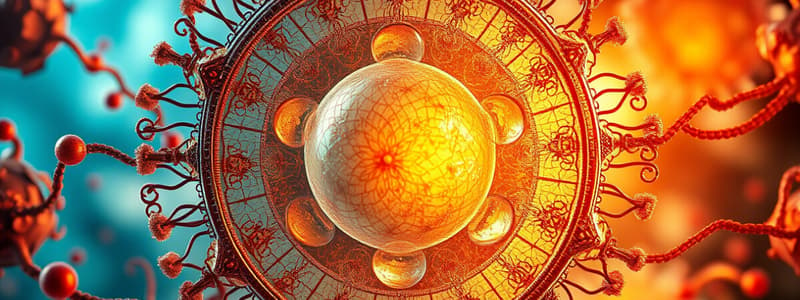Podcast
Questions and Answers
What process involves breaking down food particles into smaller units suitable for cell use?
What process involves breaking down food particles into smaller units suitable for cell use?
- Digestion (correct)
- Excretion
- Absorption
- Secretion
What is the process by which cells obtain food molecules?
What is the process by which cells obtain food molecules?
Nutrition
What is the process called when a cell absorbs water and minerals from its environment?
What is the process called when a cell absorbs water and minerals from its environment?
Absorption
What process involves the organization of complex chemicals from building units?
What process involves the organization of complex chemicals from building units?
Which of the following is a byproduct of cell activities that is not needed for further functioning?
Which of the following is a byproduct of cell activities that is not needed for further functioning?
What is the process of eliminating soluble, non-digested particles by the cell?
What is the process of eliminating soluble, non-digested particles by the cell?
What term describes substances synthesized by cells and expelled from the membrane?
What term describes substances synthesized by cells and expelled from the membrane?
What includes cell locomotion using structures like cilia and flagella?
What includes cell locomotion using structures like cilia and flagella?
Irritability refers to cells being unresponsive to external factors.
Irritability refers to cells being unresponsive to external factors.
What process involves the breakdown of food molecules into chemical energy?
What process involves the breakdown of food molecules into chemical energy?
What term refers to the process by which the cell replicates its DNA?
What term refers to the process by which the cell replicates its DNA?
Which type of cells have a true nucleus and nuclear membrane?
Which type of cells have a true nucleus and nuclear membrane?
What controls and regulates all the metabolic activities of the cell?
What controls and regulates all the metabolic activities of the cell?
What structure in the nucleus is known to produce most of the RNA?
What structure in the nucleus is known to produce most of the RNA?
What consists of linear strands of chromatin material containing genes?
What consists of linear strands of chromatin material containing genes?
How many membranes does the nuclear envelope consist of?
How many membranes does the nuclear envelope consist of?
Ribosomes are known as the "_____" for the manufacture of cell proteins.
Ribosomes are known as the "_____" for the manufacture of cell proteins.
What is the primary site for packaging cellular secretion?
What is the primary site for packaging cellular secretion?
Flashcards are hidden until you start studying
Study Notes
Functions of the Cell
- Nutrition: Process by which cells obtain food molecules to support various activities.
- Digestion: Breaking down food particles into smaller, soluble units suitable for cell use.
- Absorption: Cells absorb essential materials, such as water and minerals, from their environment.
- Biosynthesis: Cells organize complex chemicals from building units or substances.
- Excretion: Removal of by-products from cell activities that are not needed for functioning.
- Egestion: Elimination of non-digested soluble particles by the cell.
- Secretion: Expulsion of synthesized substances, such as hormones, from the cell membrane to influence extracellular activities.
- Movement: Locomotion of cells facilitated by structures like cilia and flagella.
- Irritability: Cells react and alter functions in response to external stimuli.
- Respiration: Process of breaking down food molecules to release chemical energy.
- Reproduction: Cells replicate DNA and divide, giving rise to new cells.
Types of Cells
- Prokaryotic Cells: Lack a true nucleus and nuclear membrane.
- Eukaryotic Cells: Have a true nucleus with a nuclear membrane and nucleoli.
Organelles of Living Cells
- Nucleus: Acts as the master control of the cell, regulating metabolic activities; features a double-layered membrane and is centrally located.
Structures Found in the Nucleus
- Nucleolus: Small, dense structure made of RNA; its quantity correlates with cell replication speed, as it produces RNA, particularly rRNA for ribosomes.
- Chromosome: Linear strands of chromatin containing genes made of segmented DNA, representing the traits of an individual.
- Nuclear Envelope: Composed of two membranes; the outer membrane is porous, continuous with the endoplasmic reticulum, and responsible for some secretory processes. The inner membrane stabilizes genetic material, while pores allow exchange of information between the nucleus and cytoplasm.
Cytoplasmic Organelles
- Ribosomes: Sites for protein synthesis where amino acids are joined to form polypeptide chains.
- Golgi Apparatus: Specialized section of the endoplasmic reticulum; primary site for packaging cellular secretions and synthesizing large carbohydrates while serving as temporary storage for these secretions.
Studying That Suits You
Use AI to generate personalized quizzes and flashcards to suit your learning preferences.




